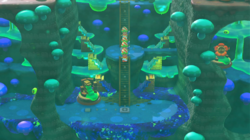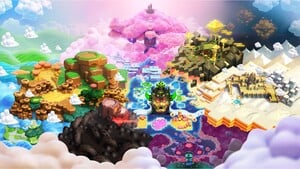Fungi Mines: Difference between revisions
mNo edit summary |
mNo edit summary |
||
| Line 66: | Line 66: | ||
{{SMBW}} | {{SMBW}} | ||
{{SMBW levels}} | {{SMBW levels}} | ||
[[Category:Jungles]] | |||
[[Category:Mines]] | [[Category:Mines]] | ||
[[Category:Super Mario Bros. Wonder worlds]] | [[Category:Super Mario Bros. Wonder worlds]] | ||
Revision as of 10:15, November 5, 2023
This article is about a subject in an upcoming or recently released game. When the game is released, or more information about this subject is found, this article may need major rewriting. This notice should be removed after a month has passed since the game was first released.
This article is under construction. Therefore, please excuse its informal appearance while it is being worked on. We hope to have it completed as soon as possible.
| Fungi Mines | |||
|---|---|---|---|

| |||
| Game | Super Mario Bros. Wonder | ||
| << List of worlds >> | |||
| |||
Fungi Mines is the fifth world in Super Mario Bros. Wonder. It is a mushroom forest with an underground cave system where ruined temples can be found. Some levels are covered in dark purple clouds, and the player must touch them to reveal the level.
This world contains green Wonder Flowers and Wonder Seeds, and there is a total of 21 Wonder Seeds and one Royal Seed to collect.
Levels
Fungi Mines contains 13 levels and a Poplin Shop.
- Upshroom Downshroom
- Taily's Toxic Pond
- Light-Switch Mansion
- Beware of the Rifts
- An Uncharted Area: Wubba Ruins
- Another Uncharted Area: Swaying Ruins
- A Final Uncharted Area: Poison Ruins
- Badge Challenge Grappling Vine I
- KO Arena Fungi Funk
- Break Time! Tumble House
- Break Time! Trottin' Piranha Plants
- Loyal Poplin's House
- Operation Poplin Rescue
Gallery
Names in other languages
| Language | Name | Meaning | Notes |
|---|---|---|---|
| Japanese | キンキン採掘場[?] Kin-kin Saikutsu-jō |
Fungi Mine; from a repetition of「菌」(kin, fungus) | |
| Chinese | 菌菌采矿场[?] Jūnjūn Cǎikuàngchǎng |
Fungi Mine | |
| German | Fungi-Mine[?] | Fungi Mine | |
| Italian | Miniera Fungispora[?] | Fungi-spore Mine | |
| Korean | 곰팡 광산[?] Gompang Gwangsan |
Mold Mine | |
| Portuguese | Minas Fungiformes[?] | Fungiform Mines | |
| Russian | Рудники Гриб Ни Цзы[?] Rudniki Grib Ni TSzy |
? | |
| Spanish | Minas Fungijí[?] | Funhaha Mines, portmanteau of the prefix "fungi-" and the onomatopoeia "jijí" (laughing) |
References


